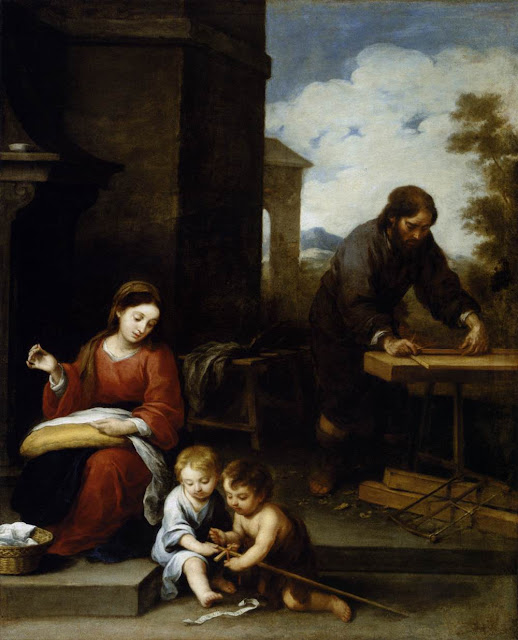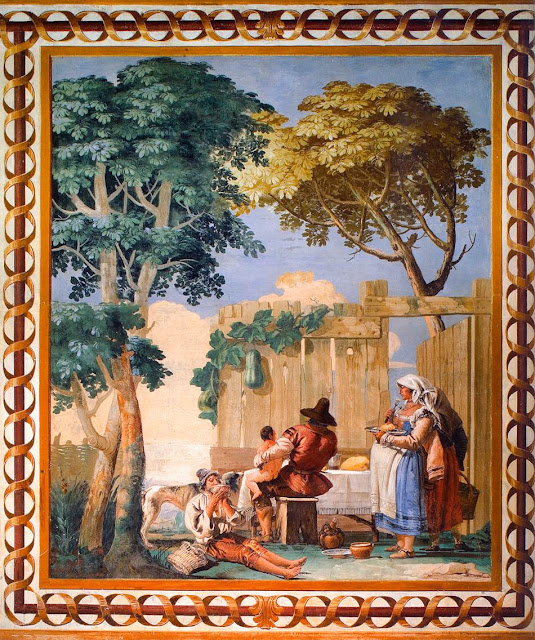The Two Trinities, Murillo, 1675-82
National Gallery, London [Web Gallery of Art]
Readings (New American Bible: Philippines, USA)
Readings (Jerusalem Bible: Australia, England & Wales, India [optional], Ireland, New Zealand, Pakistan, Scotland, South Africa)
Gospel John 16:12-15 (New Revised Standard Version, Catholic Edition, Canada)
Jesus said to his disciples:
“I still have many things to say to you, but you cannot bear them now. When the Spirit of truth comes, he will guide you into all the truth; for he will not speak on his own, but will speak whatever he hears, and he will declare to you the things that are to come. He will glorify me, because he will take what is mine and declare it to you. All that the Father has is mine. For this reason I said that he will take what is mine and declare it to you.
Responsorial Psalm
New American Bible version (Philippines, USA)
During my kinder, primary and secondary school years, 1947 to 1961, my brother and I had breakfast and dinner – a midday meal in Ireland in those days – with our mother. In the evening we had ‘tea’, as that lighter meal was known in some English-speaking countries. My father had his dinner and tea combined, the four of us together. I often heard my mother ‘complain’ about having to prepare two meals for my father in the evening. It would never have crossed her mind, or that of any other working-class housewife in urban Ireland in those days, to have dinner for the whole family in the evening.
However, we did have dinner together on Saturdays and Sunday’s. My father, like other construction workers, had a half-day on Saturday. Saturday was the only day when we had soup, very often barley soup, served in cups, not in bowls.

Phoenix Park, Dublin, in the summer [Wikipedia]
Sunday dinner was special, as it was for all families, and meant extra work for my mother who would spent the whole morning after Mass and breakfast preparing it. My father would take the two of us to meet our paternal grandfather and then for a walk in the nearby Phoenix Park.
I don’t ever recall my parents telling us that we were a family. We just knew. But it was only as an adult and after ordination that I realised that it was at our evening meals on weekdays and at our midday meals on Saturdays and Sundays that I experienced, without being aware of it, what family is. And our Sunday walks with my father were what is now called ‘bonding’. Another part of that was Dad taking us to soccer games from time to time in nearby Dalymount Park.
When I went as a young priest to the USA to study I discovered that families had to really work at being families, as the family couldn’t be taken for granted, as it still could be in Ireland at that time.
Pope Francis is probably familiar with Murillo’s painting above, The Two Trinities. In his Apostolic Exhortation Amoris Laetitia, On Love in the Family he states in No 29: With a gaze of faith and love, grace and fidelity, we have contemplated the relationship between human families and the divine Trinity. The word of God tells us that the family is entrusted to a man, a woman and their children, so that they may become a communion of persons in the image of the union of the Father, the Son and the Holy Spirit. Begetting and raising children, for its part, mirrors God’s creative work. The family is called to join in daily prayer, to read the word of God and to share in Eucharistic communion, and thus to grow in love and become ever more fully a temple in which the Spirit dwells. [Emphases added.]
Pope Francis highlights this link again in No 71: Scripture and Tradition give us access to a knowledge of the Trinity, which is revealed with the features of a family. The family is the image of God, who is a communion of persons. At Christ’s baptism, the Father’s voice was heard, calling Jesus his beloved Son, and in this love we can recognize the Holy Spirit. Jesus, who reconciled all things in himself and redeemed us from sin, not only returned marriage and the family to their original form, but also raised marriage to the sacramental sign of his love for the Church.In the human family, gathered by Christ, ‘the image and likeness’ of the Most Holy Trinity has been restored, the mystery from which all true love flows. Through the Church, marriage and the family receive the grace of the Holy Spirit from Christ, in order to bear witness to the Gospel of God’s love. [Emphases added.]

Holy Family with the infant St John, Murillo, 1655-60
Szépmûvészeti Múzeum, Budapest [Web Gallery of Art]
Almost every Catholic in Ireland went to Sunday Mass in those days and our Protestant neighbours went to church. When I was a child it was usually my father who took me to Mass on Sunday morning. And on special days such as Easter Monday, Whit (Pentecost) Monday, which were public but not Church holidays, he would take me to High Mass in one of the churches in Dublin belonging to religious orders such as the Capuchins and the Dominicans.
Before Pope Pius XII changed the Holy Week liturgies in 1955 the ceremonies on Holy Thursday, Good Friday and Holy Saturday were held in the morning. Not too many would attend these. but on the afternoon of Holy Thursday my mother would take my brother and me to visit seven churches for adoration of the Blessed Sacrament at the Altar of Repose. That practice disappeared after 1954 in Dublin but is alive and well here in the Philippines in the larger cities where it is called Visita Iglesia. This was an experience, without being aware of it, of being drawn into the wider family that is the Church.
I must confess that as a child I didn’t appreciate too much my father bringing me to High Masses or my mother bringing me to visit seven churches on Holy Thursday. But I could see clearly how Dad loved the solemnity of the High Mass and how central the Mass was to his life. He went to Mass every day of his life right up to the day he died. I am grateful now for the way my parents brought me into the life of the Blessed Trinity in this way. But I am also grateful for the way they drew me into the life of the Trinity, without being aware of it, through our daily family life, especially our evening meal together.
Judaism, Christianity and Islam are often referred to as the three monotheistic faiths. Those who belong to these three faiths believe in only One God.
I have often heard Catholics say in a well-meaning way, ‘We all believe in the same God.’ But that is not so. Only Christians believe in a God who is a communion of persons.
And Pope Francis has very forcefully reminded us that while the Most Holy Trinity is a mystery that we can never fathom, the Triune God is intimately part of our lives, especially through the sacrament of matrimony and the family: The word of God tells us that the family is entrusted to a man, a woman and their children, so that they may become a communion of persons in the image of the union of the Father, the Son and the Holy Spirit.

Family Meal, Giovanni Domenico Tiepolo, 1757
Villa Valmarana ai Nani, Vicenza, Italy [Web Gallery of Art]
Antiphona ad introitum Entrance Antiphon
Benedictus sit Deus Pater, Unigenitusque Dei Filius,
Blest be God the Father, and the Only Begotten Son of God,
Sanctus quoque Spiritus,
and also the Holy Spirit,
quia fecit nobiscum misericordiam suam.
for he has shown us his merciful love.
This is the Offertory Antiphon in the Extraordinary Form of the Mass on the Feast of the Holy Trinity.

